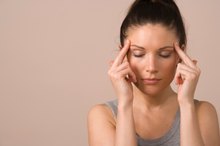Causes of a Temple Headache
The many common causes of temple headaches range from tension-type headaches to migraines, and even dental problems. Headache pain at the temples can also occur after a concussion. Other serious causes, such as meningitis and tumors, can produce temple headaches, but they tend to produce other symptoms as well.
If you are experiencing serious medical symptoms, seek emergency treatment immediately.
Tension-Type Headache
A tension-type headache is the most common form of headache 1. The pain is generally located on both sides and is squeezing, pressing and bandlike in nature, sometimes extending to the back of the head. Muscles in the area of the headache might feel mildly tender to the touch. There may be slightly blurry vision but no other vision changes. In contrast to migraines, tension-type headaches generally do not worsen in response to bright light, sounds or head movements, and nausea and vomiting generally do not occur. If the pain is severe or involves eye redness, tearing or pupil changes, it could be a different kind of headache called a cluster headache.
- A tension-type headache is the most common form of headache 1.
- If the pain is severe or involves eye redness, tearing or pupil changes, it could be a different kind of headache called a cluster headache.
Migraine Headache
What Happens to the Brain When You Get a Headache?
Learn More
Migraines affect 6 percent of men and 18 percent of women, according to the American Headache Society. Pounding or throbbing pain is typically located on one side of the head or temple, although both sides are sometimes involved. Pain also sometimes occurs behind the eye. Sensitivity to light, sound and movement is characteristic of a migraine, as is nausea and vomiting. Some people have an aura -- a temporary visual disturbance -- before or during their migraine. Auras can include seeing flashing lights or distortions like the visual effect of heat rising from hot pavement. Temporary dizziness, numbness, difficulty speaking or, rarely, difficulty moving may also occur. If you experience any of these symptoms, seek medical evaluation.
- Migraines affect 6 percent of men and 18 percent of women, according to the American Headache Society.
- Pounding or throbbing pain is typically located on one side of the head or temple, although both sides are sometimes involved.
Post-Concussion Headache
Temple headaches may occur after a concussion, even if there's no serious brain injury or loss of consciousness. A blow to the head may produce symptoms like confusion, altered memory, moodiness, altered sleeping patterns, or problems with speech, coordination or balance. Temple headaches that occur after a concussion -- known as acute post-traumatic headaches -- may be similar to tension-type headaches or resemble migraines. They generally respond to the usual treatment for whichever headache type they most closely resemble. Post-concussion headaches usually resolve within 3 months after the injury.
- Temple headaches may occur after a concussion, even if there's no serious brain injury or loss of consciousness.
Other Causes
Pain in the Base of the Head During Exercise
Learn More
Temple headaches can be triggered by dental problems, including abnormal function of the jaw joint. A temple headache in someone over age 50 might be a symptom of giant cell arteritis, which is a type of inflammation of the temporal blood vessels that might progress to vision loss 4. Giant cell arteritis may also cause pain with chewing, fatigue, scalp tenderness, low fever and unintended weight loss.
Increased pressure inside the brain -- from tumors or bleeding in or around the brain, for instance -- can cause temple headaches. But these conditions are accompanied by other nervous system symptoms, such as vision changes, nausea and vomiting, and trouble with balance. Sudden, severe headache and stiff neck can signal a hemorrhage, while a headache with a fever and stiff neck might indicate meningitis.
- Temple headaches can be triggered by dental problems, including abnormal function of the jaw joint.
- A temple headache in someone over age 50 might be a symptom of giant cell arteritis, which is a type of inflammation of the temporal blood vessels that might progress to vision loss 4.
When to Seek Medical Attention
Seek medical attention immediately if you have a headache that is much more severe than you have experienced before, especially if it is sudden and involves a stiff neck, fever, double vision, or changes in your sensations, balance, walking or wakefulness. Even if your headache is not severe, see your doctor if you experience any changes in vision, hearing, balance, speech, sensation or movement. Also seek care if you have had a recent head injury that has not been medically evaluated or if you have any other concerns.
Reviewed by: Tina M. St. John, M.D.
- Seek medical attention immediately if you have a headache that is much more severe than you have experienced before, especially if it is sudden and involves a stiff neck, fever, double vision, or changes in your sensations, balance, walking or wakefulness.
- Even if your headache is not severe, see your doctor if you experience any changes in vision, hearing, balance, speech, sensation or movement.
Related Articles
References
- British Medical Journal: Tension-Type Headache
- Australian Family Physician: Management of Chronic Headache
- American Family Physician: Cluster Headache
- American College of Rheumatology: Giant Cell Arteritis
- American Association of Neurological Surgeons: Concussion
- Lee VME, Ang LL, Soon DTL, Ong JJY, Loh VWK. The adult patient with headache. Singapore Med J. 2018;59(8):399-406. https://doi.org/10.11622/smedj.2018094
- Ertsey C, Magyar M, Gyüre T, Balogh E, Bozsik G. [Tension type headache and its treatment possibilities]. Ideggyogy Sz. 2019;72(1-2):13-21. https://doi.org/10.18071/isz.72.0013
- Ahmed F. Headache disorders: differentiating and managing the common subtypes. Br J Pain. 2012;6(3):124-32. https://doi.org/10.1177/2049463712459691
- Goadsby PJ, Holland PR, Martins-oliveira M, Hoffmann J, Schankin C, Akerman S. Pathophysiology of Migraine: A Disorder of Sensory Processing. Physiol Rev. 2017;97(2):553-622. https://doi.org/10.1152/physrev.00034.2015
- Peres MFP, Mercante JPP, Tobo PR, Kamei H, Bigal ME. Anxiety and depression symptoms and migraine: a symptom-based approach research. J Headache Pain. 2017;18(1):37. https://doi.org/10.1186/s10194-017-0742-1
- Kim DY, Lee MJ, Choi HA, Choi H, Chung CS. Clinical patterns of primary stabbing headache: a single clinic-based prospective study. J Headache Pain. 2017;18(1):44. https://doi.org/10.1186/s10194-017-0749-7
- Tofangchiha S, Rabiee B, Mehrabi F. A Study of Exertional Headache's Prevalence and Characteristics Among Conscripts. Asian J Sports Med. 2016;7(3):e30720. https://doi.org/10.5812/asjsm.30720
- Cordenier A, De hertogh W, De keyser J, Versijpt J. Headache associated with cough: a review. J Headache Pain. 2013;14:42. https://doi.org/10.1186/1129-2377-14-42
- Schwedt TJ. Thunderclap Headache. Continuum (Minneap Minn). 2015;21(4 Headache):1058-71. https://doi.org/10.1212/CON.0000000000000201
- Chowdhury D. Tension type headache. Ann Indian Acad Neurol. 2012;15(Suppl 1):S83-8. https://doi.org/10.4103/0972-2327.100023
- Rutberg S, Öhrling K. Migraine--more than a headache: women's experiences of living with migraine. Disabil Rehabil. 2012;34(4):329-36. https://doi.org/10.3109/09638288.2011.607211
- Hoffmann J, Recober A. Migraine and triggers: post hoc ergo propter hoc?. Curr Pain Headache Rep. 2013;17(10):370. https://doi.org/10.1007/s11916-013-0370-7
- Peterfy RJ, Khazaeni B. Temporal (Giant Cell) Arteritis. [Updated 2018 Nov 14]. In: StatPearls [Internet]. Treasure Island (FL): StatPearls Publishing; 2019 Jan-.
- Kim BK, Cho SJ, Kim BS, et al. Comprehensive Application of the International Classification of Headache Disorders Third Edition, Beta Version. J Korean Med Sci. 2016;31(1):106-13. https://doi.org/10.3346/jkms.2016.31.1.106
- Cameron C, Kelly S, Hsieh SC, et al. Triptans in the Acute Treatment of Migraine: A Systematic Review and Network Meta-Analysis. Headache. 2015;55 Suppl 4:221-35. https://doi.org/10.1111/head.12601
- Lee VME, Ang LL, Soon DTL, Ong JJY, Loh VWK. The adult patient with headache. Singapore Med J. 2018;59(8):399-406.
- Ertsey C, Magyar M, Gyüre T, Balogh E, Bozsik G. [Tension type headache and its treatment possibilities]. Ideggyogy Sz. 2019;72(1-2):13-21.
- Ahmed F. Headache disorders: differentiating and managing the common subtypes. Br J Pain. 2012;6(3):124-32.
- Goadsby PJ, Holland PR, Martins-oliveira M, Hoffmann J, Schankin C, Akerman S. Pathophysiology of Migraine: A Disorder of Sensory Processing. Physiol Rev. 2017;97(2):553-622.
- Peres MFP, Mercante JPP, Tobo PR, Kamei H, Bigal ME. Anxiety and depression symptoms and migraine: a symptom-based approach research. J Headache Pain. 2017;18(1):37.
- Kim DY, Lee MJ, Choi HA, Choi H, Chung CS. Clinical patterns of primary stabbing headache: a single clinic-based prospective study. J Headache Pain. 2017;18(1):44.
- Tofangchiha S, Rabiee B, Mehrabi F. A Study of Exertional Headache's Prevalence and Characteristics Among Conscripts. Asian J Sports Med. 2016;7(3):e30720.
- Cordenier A, De hertogh W, De keyser J, Versijpt J. Headache associated with cough: a review. J Headache Pain. 2013;14:42.
- Schwedt TJ. Thunderclap Headache. Continuum (Minneap Minn). 2015;21(4 Headache):1058-71.
- Manandhar K, Risal A, Steiner TJ, Holen A, Linde M. The prevalence of primary headache disorders in Nepal: a nationwide population-based study. J Headache Pain. 2015;16:95. PMID:26554602
- Chowdhury D. Tension type headache. Ann Indian Acad Neurol. 2012;15(Suppl 1):S83-8.
- Puledda F, Messina R, Goadsby PJ. An update on migraine: current understanding and future directions. J Neurol. 2017;264(9):2031-2039. PMID:28321564
- Rutberg S, Öhrling K. Migraine--more than a headache: women's experiences of living with migraine. Disabil Rehabil. 2012;34(4):329-36.
- Hoffmann J, Recober A. Migraine and triggers: post hoc ergo propter hoc?. Curr Pain Headache Rep. 2013;17(10):370.
- Peterfy RJ, Khazaeni B. Temporal (Giant Cell) Arteritis. [Updated 2018 Nov 14]. In: StatPearls [Internet]. Treasure Island (FL): StatPearls Publishing; 2019 Jan-.
- Kim BK, Cho SJ, Kim BS, et al. Comprehensive Application of the International Classification of Headache Disorders Third Edition, Beta Version. J Korean Med Sci. 2016;31(1):106-13.
- Cameron C, Kelly S, Hsieh SC, et al. Triptans in the Acute Treatment of Migraine: A Systematic Review and Network Meta-Analysis. Headache. 2015;55 Suppl 4:221-35.
- Headache Disorders. World Health Organization, April 2016.
- Chowdbury D. Tension Type Headache. Annals of Indian Academy of Neurology, 2012. doi: 10.4103/0972-2327.100023
- Headache Classification Subcommittee of the International Headache Society. The International Classification of Headache Disorders: 3rd Edition. Cephalalgia 2013 Jul; 33(9): 629:808. doi: 10.1177/0333102413485658
- Ornello R, et al. Migraine and Body Mass Index Categories: A Systematic Review and Meta-Analysis of Observational Studies. Journal of Headache Pain. 2015. doi: 10.1186/s10194-015-0510-z
- Torelli P, Jensen R, Olesen J. Physiotherapy for Tension-Type Headache: A Controlled Study. Cephalalgia, 2004. doi: 10.1111/j.1468-2982.2004.00633.x
Writer Bio
Based outside Boston, Jennifer Markowitz received her M.D. from the University of Pennsylvania and completed residency training at the Children's Hospitals of Philadelphia and Boston. She is board-certified in Pediatric Neurology and Neuromuscular Medicine. Her writing and presentations have focused on both scientific and patient audiences.









